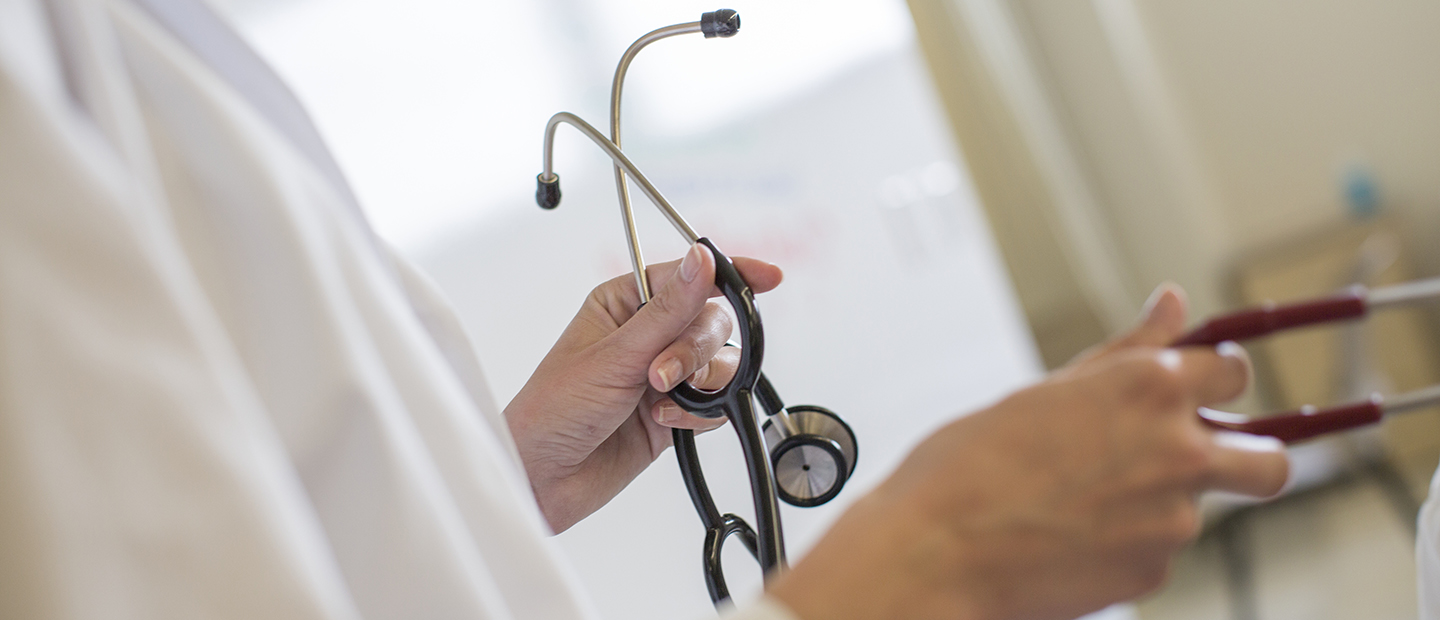
Master of Physician Assistant Science
Master of Physician Assistant Science (MPAS) is a professional graduate program in the Department of Clinical and Diagnostic Sciences which prepares individuals for licensure and entry into the physician assistant profession. As a PA, you will diagnose illness, develop and manage treatment plans, prescribe medications, often serve as a patient’s principal health care provider, and play a pivotal role in improving health care access and quality.
Oakland University's Master of Physician Assistant Science program is generously supported in part by Humana.
Physician Assistant ranked number three in 100 Best Jobs of 2025 by U.S News & World Report. The profession also ranked second on U.S. News' list for Best Health Care Jobs and third for Best STEM Jobs. The rankings take into account the most important aspects of a job, including growth potential, work-life balance and salary.
Consider this position if you:
- have a passion for working with others
- want to be involved in team-based, patient care
- have a strong aptitude for science
The OU MPAS admissions cycle for 2027 will begin in April 2026. If you are selected for an interview with the Admissions Committee, you will be contacted in September 2026.
Important information for Applicants:
The ARC-PA has granted Accreditation-Provisional status to the Oakland University Master of Physician Assistant Science Program sponsored by Oakland University.
Accreditation-Provisional is an accreditation status granted when the plans and resource allocation, if fully implemented as planned, of a proposed program that has not yet enrolled students appear to demonstrate the program’s ability to meet the ARC-PA Standards or when a program holding Accreditation-Provisional status appears to demonstrate continued progress in complying with the Standards as it prepares for the graduation of the first class (cohort) of students.
Accreditation-Provisional does not ensure any subsequent accreditation status. It is limited to no more than five years from matriculation of the first class.
The program's accreditation history can be viewed on the ARC-PA website.
Contact Us
Please direct all admissions questions to [email protected].
Carol Piesik, DHSc, MS, PA-C
Director (Interim), Associate Professor of Practice
Physician Assistant Science
[email protected]
Daniel Burns
Office Assistant
[email protected]
(248) 364-8679
Mission Statement
To prepare high quality physician assistants, exceptionally trained to practice evidence-based medicine and embrace culturally diverse and inclusive environments, who will serve each person with compassion and professionalism.
Vision Statement
To transform students, through rigorous academic preparation and excellence in clinical skill development, into leading members of collaborative health care teams, providing empathetic and inclusive care and leaving lasting impacts on the patients and communities they serve.
- Support the OU MPAS Program’s mission by admitting a diverse cohort of highly qualified students and supporting their success throughout the program to graduation.
- Prepare Physician Assistant students to demonstrate proficiency in medical knowledge and clinical skills, ensuring readiness to competently deliver healthcare as entry-level Physician Assistants.
- Provide interprofessional educational opportunities to foster critical thinking, effective communication, and collaboration with other members of the healthcare community.
- Demonstrate professionalism in all aspects of the OU MPAS Program and foster a commitment to lifelong learning to ensure continuous personal and professional growth in the evolving field of healthcare.
- Provide diverse experiential learning opportunities through the OU MPAS Program curriculum to enhance student understanding and application of cultural awareness, social determinants of health, and effective communication strategies in medical practice.
OU MPAS Program Competencies (ARC-PA Std A3.012g)
PC = Program Competency
PC 1. Medical Knowledge
- Demonstrate the ability to apply biomedical and clinical sciences to patient care, integrating pathophysiology, diagnosis, and management of common conditions.
- Integrate into practice basic principles of public health including epidemiology, disease prevention, surveillance, reporting, and the maintenance of population health.
- Demonstrate sufficient knowledge of the different types of healthcare systems, including the legal, regulatory, insurance, reimbursement, billing/coding, and patient safety issues related to the practice of medicine.
PC 2. Interpersonal and Communication Skills
- Demonstrate effective documentation of medical information in an accurate, logical, and understandable manner.
- Exhibit effective communication with patients, families, and healthcare teams through clear, empathetic, and culturally competent interactions.
PC 3. Clinical and Technical Skills
- Provide evidence-based, patient-centered care that includes history-taking, physical examination, diagnosis, and management, ensuring treatment plans align with patient needs and values.
- Perform and document essential diagnostic and therapeutic procedures accurately and safely within the PA scope of practice.
- Demonstrate the ability to gather clinical information, formulate differential diagnoses, order, and interpret laboratory studies and imaging.
PC 4. Clinical Reasoning and Problem-Solving Abilities
- Apply critical thinking to identify, prioritize, and address patient problems, ensuring logical and efficient decision-making in various clinical scenarios (e.g., acute, chronic, emergent, or preventive).
- Deliver equitable healthcare by recognizing and addressing social determinants of health and cultural differences affecting patient care.
- Critically evaluate medical literature and integrate findings into clinical practice to improve patient outcomes and personal performance.
- Navigate healthcare systems effectively to deliver cost-conscious care, advocate for quality improvement, and collaborate in multidisciplinary teams.
PC 5. Professional Behavior
- Uphold ethical principles, sensitivity to diversity, and adherence to legal and regulatory requirements in all professional interactions.
Technical standards are published to allow a student candidate the ability to make an informed decision regarding application to the MPAS program. These standards are considered necessary to successfully complete the didactic and clinical portions of the program as well as continue with the skills necessary to progress to clinical competency as a practitioner.
Academic adjustments can be made for disabilities in some instances, but a student must be able to perform in a reasonably independent manner.
The Disability Support Services Office (DSS) assists current and prospective students who are requesting accommodations to access the programs and services at Oakland University. Accommodations are determined through an interactive, individualized, case by case interview between DSS and the student. Application for accommodations and documentation guidelines can be found on the DSS website. https://oakland.edu/dss/student-resources/accommodations/.
Practitioners in healthcare must have the knowledge, skills, and abilities to function in a wide variety of clinical experiences and patient care scenarios. Students in the Master of Physician Assistant Science Program must be able to integrate, analyze and synthesize data consistently and accurately.
Technical standards are addressed in seven categories: observation; communication; motor; sensory; strength, mobility, and endurance; intellectual including conceptual, integrative, and quantitative; and behavioral and social.
Requirements for Admission, Promotion, Continuation and Graduation
Minimal Technical Standards
- Observation: Candidates and students must have sufficient uncorrected or corrected visual acuity, depth perception, and color perception to be able to observe demonstrations, experiments, laboratory exercises and lectures in the basic and clinical sciences. They must be able to observe a patient accurately at a distance and up close. Vision must be sufficient to utilize clinical instrumentation; observe written and graphic information (such as EKGs and X rays); identify clinical landmarks and textural changes on anatomical structures; and observe patient physical qualities such as posture, locomotion, and movement in a clinical setting. Observing the patient includes the use of visual, auditory, and somatic sensation, and is enhanced by the functional use of other sensory modalities.
- Communication: Candidates and students must be able to communicate effectively and sensitively using both oral and written communication skills with patients, their families, and with all members of the health care team using traditional or non-traditional means. The candidate must be able to create and comprehend written materials such as medical records, laboratory reports, and pharmacological prescriptions. The candidate must possess adequate interpersonal skills, empathy toward others, and a willingness to interact cooperatively in all professional environments.
- Motor: Candidates and students must have sufficient motor functions to execute movements required to perform laboratory exercises and provide clinical care. Such actions require coordination of both gross and fine motor movements and equilibrium, and functional use of the senses of touch and vision. The candidate must possess the motor skills necessary to perform palpation, percussion, auscultation, and other diagnostic maneuvers to complete basic and specialized portions of the physical examination of a patient and is expected to execute movements and assume reasonable bodily postures required to provide diagnostic evaluation and treatment of patients including emergency medical care.
- Sensory: Candidates and students must have functional use of sensory skills such as tactile discrimination and proprioception for classroom, laboratory, and clinical experiences. Functional use of hearing and vision are also required and are described in the sections above.
- Strength, Mobility and Endurance: Candidates and students must have sufficient upright posture, balance, flexibility, mobility, strength, and cardiovascular endurance for standing, sitting, lifting moderate weight and participating in classroom, laboratory and clinical experiences.
- Intellectual: Candidates and students must have sufficient cognitive capabilities to assimilate the detailed and complex information presented in formal lectures, small group discussions, individual teaching sessions, and clinical settings. The ability to measure, calculate, reason, analyze, recall and synthesize information across various modalities; understand spatial relationships of structure and form and test hypothesizes are essential components of critical thinking. Problem solving, the critical and essential skill demanded of physicians, requires all these intellectual abilities. These problem-solving skills must be performed in a timely fashion.
- Behavioral and Social: Candidates and students must possess the demeanor and maturity required for full utilization of his or her intellectual abilities. This includes interactions with faculty, staff, student colleagues and the general population. Students must exercise good judgment in diagnosis and treatment of patients. Required skills include the ability to function in stressful and demanding environments, and demonstration of the flexibility to cope with changing situations and the ambiguity inherent in medical problem solving.
Candidates and students must consistently demonstrate compassion, honesty, integrity, concern, and respect for self and others. In addition to possessing an intrinsic desire for excellence, the candidate must possess tolerance for and acceptance of difference, and show interest and motivation to become an effective PA.
Students are expected to demonstrate appropriate behavior at all times in their personal and professional life. Failure to do so can result in dismissal. Examples of inappropriate behavior include but are not limited to substance abuse, sexual harassment and other forms of harassment, violent behavior, and illegal activities.
Oakland University MPAS program will also include a link in the Student Handbook, the “Core Competencies for New Physician Assistant Graduates” as developed by PAEA to include:
- Patient Centered Practice Knowledge
- Society and Population Health
- Health Literacy and Communication
- Interprofessional Collaborative Practice and Leadership
- Professional and Legal aspects of healthcare
And the “Competencies for the Physician Assistant Profession” as developed by the National Commission on Certification of Physician Assistants (NCCPA), Accreditation and Review Commission on Education for the Physician Assistant (ARC-PA), Physician Assistant Education Association (PAEA), and the American Academy of Physician Assistants (AAPA) to include competency areas related to:
- Medical knowledge
- Interpersonal and Communication Skills
- Patient care
The admissions cycle for the 2026–2027 cohort of the OU MPAS Program is now open.
Oakland University does not discriminate based on age, race, color, gender, national origin, or ethnicity in administering admissions, educational policies, scholarships, and loan programs.
- CASPA application opens: April 30, 2026
- Application deadline (submitted and CASPA-verified): August 1, 2026 (applications submitted after August 1, 2026 will not be considered)
- The supplemental application fee must be paid by August 15, 2026. Fees will not be accepted after this date. Applications submitted without payment of the supplemental fee will not be considered.
- Interview period: September – November 2026 (applicants selected for interviews will be notified by August 28, 2026)
- Notification of admission decisions: November 2026
- Program start date: January 6, 2027
All CASPA-verified applicants are evaluated by the admissions committee based on the following criteria:
- Overall GPA
- Prerequisite GPA
- Shadowing experience
- Letters of recommendation
- Content of personal statement
- 500 hours of Direct Patient Care (Work Experience)
Please note that meeting minimum admissions requirements does not guarantee an invitation for interview.
Interviews will be offered to applicants through a ranking process that includes overall GPA, prerequisite GPA, quality of shadowing experience, letters of recommendation, personal statement and work experience.
- Overall GPA: Points are assigned based on strength of overall GPA; a higher GPA will result in a higher score
- Prerequisite GPA: Points are assigned based on strength of average GPA of all prerequisite courses; a higher GPA will result in a higher score.
- Quality of shadowing experience: Well-documented experience with detailed explanation of witnessed PA role will result in a higher score.
- Letters of recommendation: Points are assigned based on review of evaluator's responses, with more favorable responses resulting in a higher score.
- Personal statement: Points are awarded based on student's ability to display effective communication free of grammatical errors, while demonstrating an understanding of the PA role, including personal attributes and experiences that have prepared them for PA school admission.
- Direct patient care (work experience): Maximum points are awarded with documentation that each student applicant has completed the required 500 hours of work experience.
GPA: Even though the minimum GPA is 3.0, more points are awarded for higher GPAs (Undergraduate GPA and Prerequisite GPA).
During interviews, candidates will have in-person conversations with the admissions committee and will be assessed for:
- Understanding of the PA role and profession.
- Academic potential and readiness for the program’s rigorous curriculum.
- Motivation, maturity, self-awareness, and interpersonal skills.
- Professionalism and maturity.
- Communication and interaction skills.
- Leadership experience.
- Demonstrated service or volunteerism.
Selection of students for acceptance is based on review of the pre-interview (application) ranking score and the interview performance score. Those with the highest awarded cumulative score will be offered a seat in the program.
Applicants offered acceptance into the program will be required to complete a health screening, immunization verification, drug screening, criminal background check, and fingerprinting prior to matriculation. All associated costs are the applicant’s responsibility. Applicants must understand that the results of the above may affect matriculation into the program and clinical placements.
Preferences given:
In alignment with OU MPAS Program mission and goals, in the event that there are two equally qualified candidates based on the points earned for admission criteria and interview, preference will be given to applicants who meet ANY of the following diversity criteria:
- Applicants reside in the Health Professions Shortage Area (HPSA) or Medically Underserved Communities (MUC).
- Applicants who come from economically disadvantaged backgrounds.
- Applicants who are first-generation college students.
- Applicants who are veterans or active reserve members.
Applicants must meet technical standards that demonstrate abilities to perform as a physician assistant.
For Technical Standards (Standard A3.13e), please see the General Program Information tab on this page and select Technical Standards.
Important information for applicants:
The ARC-PA has granted Accreditation-Provisional status to the Oakland University Master of Physician Assistant Science Program sponsored by Oakland University.
Accreditation-Provisional is an accreditation status granted when the plans and resource allocation, if fully implemented as planned, of a proposed program that has not yet enrolled students appear to demonstrate the program’s ability to meet the ARC-PA Standards or when a program holding Accreditation-Provisional status appears to demonstrate continued progress in complying with the Standards as it prepares for the graduation of the first class (cohort) of students.
Accreditation-Provisional does not ensure any subsequent accreditation status. It is limited to no more than five years from matriculation of the first class.
Please direct all admissions questions to [email protected].
The OU MPAS Program seeks applicants who demonstrate:
- A clear understanding of the PA profession
- Strong personal and professional integrity, responsibility, and resilience
- Maturity and ethical growth
- Academic readiness
- A commitment to compassionate, patient-centered care
- The ability to integrate medical knowledge with patient communication and therapeutic relationships
- Sustained engagement in direct patient care
- Thoughtful reflection on clinical and shadowing experiences
- The ability to function effectively within team-based health care environments
- Clear communication skills
- A commitment to lifelong learning
Application Review and Interview Selection
All CASPA-verified applications are reviewed, evaluated and ranked by the OU MPAS Admissions Committee.
Applications are assessed using a structured, point-based scoring rubric. Points are assigned across multiple domains to ensure a consistent and objective evaluation process. The following criteria contribute to the overall composite score:
- Overall undergraduate GPA
- Prerequisite GPA
- Shadowing experience
- Casper score
- Quantity and quality of direct patient care (work) experience
Each domain is scored according to predetermined benchmarks, with stronger academic performance, more substantive experiential preparation and higher assessment performance resulting in a higher overall application score.
Meeting minimum admissions requirements does not guarantee an invitation to interview. Interview invitations are extended to applicants whose composite application score and overall profile demonstrate strong potential for success in the Program and the Physician Assistant profession.
Interview Process
Interviews are conducted in person with members of the OU MPAS Admissions Committee.
During the interview, applicants will be assessed on the following domains:
- Understanding of the Physician Assistant profession
- Academic readiness for a rigorous graduate-level curriculum
- Motivation, self-awareness and professionalism
- Communication and interpersonal skills
- Maturity and ethical judgment
- Leadership experiences
- Commitment to service or volunteerism
Admission Decisions
Final admission decisions are based on a combined evaluation of the applicant’s application ranking score and interview performance score. Applicants with the highest cumulative scores are offered admission to the program.
Program Preferences
In alignment with the OU MPAS program mission and goals, when two applicants are equally qualified based on application and interview scores, preference will be given to individuals who meet one or more of the following criteria:
- Residence in a Health Professional Shortage Area (HPSA) or Medically Underserved Community (MUC)
- Economically disadvantaged background
- First-generation college student
- Veteran or active reserve service member
Post-Acceptance Requirements
Applicants offered a seat in the program must successfully complete all required pre-matriculation clearances prior to enrollment, including:
- Health screening and immunization verification
- Drug screening
- Criminal background check
- Fingerprinting
All associated costs are the responsibility of the applicant. Failure to meet these requirements may affect eligibility for matriculation.
Contact Information
All admissions-related questions should be directed to: [email protected]
Admission to the Oakland University Master of Physician Assistant Science (OU MPAS) Program is competitive. Meeting minimum requirements does not guarantee an interview or acceptance. Applicants are encouraged to exceed minimum standards and submit a strong, well-rounded application.
The OU MPAS Program follows Oakland University graduate admission policies in addition to the program-specific requirements outlined below.
- Degree and Academic Eligibility
- Applicants must complete a Bachelor’s degree from an accredited United States institution by the time of submitting the CASPA application.
- Applicants who earned a degree outside the United States must comply with Oakland University's graduate admission policies for international students. This includes the submission of a transcript evaluation from a current member of the National Association of Credential Evaluation Services (NACES).
- Applicants whose first language is not English must demonstrate English language proficiency in accordance with Oakland University requirements.
- GPA Requirements
- Applicants must meet the following minimum GPA standards:
- Minimum cumulative GPA of 3.0 on a 4.0 scale.
- Minimum prerequisite GPA of 3.0 on a 4.0 scale.
- Applicants must meet the following minimum GPA standards:
- Standardized Testing
- All applicants must complete the Casper Situational Judgment Assessment as part of the application process.
- No other standardized tests, such as the GRE, MCAT, or PA-CAT, are required. Scores from these tests will not be considered in the admissions review, even if submitted.
- Direct Patient Care (Work) Experience
- A minimum of 500 hours of direct patient care (paid work) experience is required prior to application submission.
- Direct patient care experience must be completed in the United States within four (4) years of application submission.
- Direct patient care experience will be evaluated based on the number of hours completed and the scope of the experience. Please see acceptable experience types.
- Shadowing Experience
- Applicants are required to complete in-person shadowing with two (2) Physician Assistants for a minimum of 16 total hours.
- Applicants must document the Physician Assistants shadowed, including names, credentials and the clinical duties observed.
- Shadowing must be a dedicated observational experience. Shadowing completed at an applicant’s place of employment is not permitted, and time spent performing job-related duties (e.g., medical assistant, CNA, technician) be counted toward shadowing hours.
- Shadowing health care professionals other than Physician Assistants is not permitted.
- Virtual shadowing will not be considered.
- Prerequisite Coursework
- Required Prerequisite Courses:
- Human Anatomy with Lab (lab must be completed in-person; online lab is not accepted, except for coursework completed during the 2020–2021 academic year)
- Human Physiology
- English Composition (AP credits accepted)*
- Statistics (AP credits accepted)*
- Biochemistry or Organic Chemistry
- Medical Terminology
- Microbiology
- Developmental Psychology
- Nutrition
- *Please note that Advanced Placement (AP) credits are not calculated into the GPA by CASPA, which may impact your calculated overall and prerequisite GPA score.
- Applicants must complete all prerequisite coursework before submitting the application.
- Each prerequisite course must be completed with a minimum grade of 3.0 on a 4.0 scale within 10 years of the application deadline (no earlier than August 1, 2016).
- Oakland University Courses That Meet Prerequisite Requirements
- Human Anatomy with Lab: BIO 2100 and BIO 2101
- Human Physiology: BIO 2600, BIO 3620, BIO 4620, CDS 4010, EXS 3010, NUR 2011
- English Composition: WRT 1050, WRT 1060, WRT 3081
- Statistics: PSY 2510, STA 2220, STA 2222, STA 2226
- Biochemistry or Organic Chemistry: CHM 2010, CHM 2340, CHM 2350, BIO 3230, BIO 3232, CDS 4250
- Medical Terminology: CDS 2100
- Microbiology: CDS 3300, CDS 4300, BIO 2200, BIO 3500, BIO 3520, BIO 4530
- Developmental Psychology: PSY 2250, PSY 3210, PSY 3220, PSY 3230
- Nutrition: HS 2500, NTR 2500, EXS 2410
- Determining Course Equivalency from Another Institution
- Applicants who completed coursework at institutions other than Oakland University may use the OU Transfer Equivalency Tool to determine whether their courses meet prerequisite requirements.
- Select the institution where the course was completed.
- Enter the corresponding Oakland University course number listed above.
- Courses listed as equivalent will satisfy the prerequisite requirement.
- If no equivalent course is listed, the course has not been pre-approved as meeting the prerequisite requirement.
- If you would like the Admissions Committee to evaluate a course for prerequisite equivalency, please submit the OU MPAS Prerequisite Review Form. A detailed course syllabus must be included with the request for the review to be considered.
- Applicants who completed coursework at institutions other than Oakland University may use the OU Transfer Equivalency Tool to determine whether their courses meet prerequisite requirements.
- Prerequisite Waiver Requests
- Applicants may submit an OU MPAS Prerequisite Waiver Request if they can demonstrate mastery of required content through upper-level coursework or relevant professional experience (link will be embedded).
- Submission of a waiver request does not guarantee approval.
- All waiver requests are reviewed by the Admissions Committee.
- A detailed course syllabus is required for waiver consideration.
- Transfer Credit Policy
- Transfer of credits from other Physician Assistant programs is not permitted.
- Required Prerequisite Courses:
To be eligible for application review, applicants must complete both of the following steps:
- Submit an application through CASPA (Central Application Service for Physician Assistants).
- Pay a $100 non-refundable supplemental application fee directly to Oakland University.
Once CASPA verifies an application, eligible applicants will receive an email from the OU Graduate School with instructions for submitting the supplemental application fee. Applications will not be reviewed until both steps are completed. Failure to complete either step will result in the application being considered incomplete and ineligible for review.
Applicants are encouraged to use the CASPA Application Checklist to prepare required materials prior to submission.
Contact Information
All admissions-related questions should be directed to [email protected].
The MPAS program includes theoretical, clinical practice, and research courses and experiences to prepare graduates to function in a variety of settings.
- The MPAS program is a 28 month, full-time, year-round program
- Students will need to complete 100 credits to graduate from the program
- The didactic phase is 16 months (from January to April of the next year)
- The clinical phase follows the didactic phase for 12 months (from May to April)
Curriculum Outline
Didactic Courses - 4 semesters, 60 credit hours
Semester 1 (15 credit hours)
- PAS 5010: Anatomical Science (5 credits)
- PAS 5020: Foundations in Medical Science (4 credits)
- PAS 5040: Psychosocial Factors in Medicine (2 credits)
- PAS 5050: Public Health Science (2 credits)
- PAS 5060: Physician Assistant Professional Practice (2 credits)
Semester 2 (15 credit hours)
- PAS 5110: Clinical Medical Science and Reasoning I (5 credits)
- PAS 5120: Pharmacology I (2 credits)
- PAS 5130: Patient Assessment Across the Lifespan I (4 credits)
- PAS 5140: Diagnostic Sciences I (2 credits)
- PAS 5150: Ethics and Evidence Based Medicine (2 credits)
Semester 3 (15 credit hours)
- PAS 5210: Clinical Medical Science and Reasoning II (5 credits)
- PAS 5220: Pharmacology II (2 credits)
- PAS 5230: Patient Assessment Across the Lifespan II (4 credits)
- PAS 5240: Diagnostic Sciences II (2 credits)
- PAS 5250: Trends in Medicine and Wellness (2 credits)
Semester 4 (15 credit hours)
- PAS 5310: Clinical Medical Science and Reasoning III (5 credits)
- PAS 5320: Pharmacology III (2 credits)
- PAS 5330: Patient Assessment Across the Lifespan III (4 credits)
- PAS 5340: Diagnostic Sciences III (2 credits)
- PAS 5360: Infectious Disease Principles (2 credits)
Clinical Courses - 3 semesters, 40 credit hours
Required Rotations
- PAS 6100: Family Medicine Clinical Practicum (4 credits)
- PAS 6200: Emergency Medicine Clinical Practicum (4 credits)
- PAS 6300: Internal Medicine Clinical Practicum (4 credits)
- PAS 6400: Surgery Clinical Practicum (4 credits)
- PAS 6500: Pediatrics Clinical Practicum (4 credits)
- PAS 6600: Women’s Health Clinical Practicum (4 credits)
- PAS 6700: Behavioral Medicine Clinical Practicum (4 credits)
Elective Rotations
- PAS 6810: Clinical Elective I (4 credits)
- PAS 6820: Clinical Elective II (4 credits)
Capstones Required
- PAS 6900: PA Science Capstone I (Spring/Summer - 1 credit)
- PAS 6910: PA Science Capstone II (Fall - 1 credit)
- PAS 6920: PA Science Capstone III (Winter - 2 credits)
Faculty

Carol Piesik, DHSc, MS, PA-C
Director (Interim), Associate Professor of Practice — Physician Assistant Science

Christopher Davis, MPAS, PA-C
Clinical Coordinator, Assistant Professor of Practice — Physician Assistant Science

Alexandra Guajardo, Ph.D., M.S., PA-C, CLS
Assessment and Compliance Coordinator, Academic Coordinator, Assistant Professor of Practice — Physician Assistant Science

Sean O'Brien, M.S., PA-C
Admissions Coordinator, Assistant Professor of Practice — Physician Assistant Science
Contributing Faculty

Dale Telgenhoff, Ph.D., MBA, CCM, HTL(ASCP)CM
Coordinator, Associate Professor
Clinical and Diagnostic Sciences
Part-Time Faculty
Sumit Dinda, Ph.D., NRP, IC (EMS)
Chairperson and Professor
Clinical and Diagnostic Sciences
Florence J. Hoffert-Dallo, Ph.D., MPH
Interim Chairperson, Professor
Public Health
Edward Rohn, Ph.D.
Director, Associate Professor
Interdisciplinary Health Sciences
Mary Bee, Ph.D.
Special Lecturer
Biological and Anatomical Sciences
Staff

Daniel Burns
Office Assistant III
Master of Physician Assistant Science Program
[email protected]
(248) 364-8679

Wendy Mosella
Office Assistant III
Master of Physician Assistant Science Program
[email protected]
(248) 364-8679
Leadership

Chris Wilson, DSc.P.T., DPT, GCS
Associate Dean, Associate Professor
3114 Human Health Building
[email protected]
(248) 364-8695

Leigh Settlemoir, Ph.D., SPHR
Assistant Dean
3113 Human Health Building
[email protected]
(248) 364-8671

Janice Eaton
Coordinator of Graduate and Community Relations
3176 Human Health Building
[email protected]
(248) 364-8699

Jillian Wolf, MBA
Coordinator of Communications, Enrollment and Marketing
3146 Human Health Building
[email protected]
(248) 364-8902
We invite you to attend one of our Information Sessions that will cover prerequisite requirements, application instructions, and application timeline. Registration is not required to attend.
Information Session Dates
Feb. 27, 2026 from 5:30 - 7 p.m. (virtual)
March 10, 2026 from 5:30-7 p.m. (in-person at Oakland West Center)
April 14, 2026 from 5:30-7 p.m. (in-person at Oakland West Center)
May 12, 2026 from 5:30 - 7 p.m. (virtual)
June 9, 2026 from 5:30-7 p.m. (in-person at Oakland West Center)
July 14, 2026 from 5:30 - 7 p.m. (virtual)
August 11, 2026 from 5:30-7 p.m. (in-person at Oakland West Center)
Please fill out the MPAS information session registration form to attend.
Location for in-person sessions:
Oakland West Center (OWC)
Large Lecture Hall (Classroom 268)
1500 University Drive
Auburn Hills, Michigan 48326
Directions (MPAS Program is not on Main Campus):
On I-75 please use Exit 79: University Drive.
OWC is 0.8 miles west of I-75, past Opdyke.
The center is on the south side of the road (or left side).
Park at the back of the building.
Use building entrance #9.
Take the elevator or stairs to the second floor.
Classroom 268 (Large Lecture Hall) is on the left.
Please note: The Information Sessions are not designed to go through each person's transcripts to determine equivalencies and qualifications.
For more information, please email [email protected].
Effective in meeting the program goals (Standard A3.12.b)
Program data will be published when available.
NCCPA PANCE Exam Performance (Standard A3.12.c)
Program data will be published when available.
Attrition Data (Standard A3.12.i)
Program data will be published when available.
Physician assistants are versatile and collaborative medical professionals. PAs practice in every medical setting in all 50 states and the District of Columbia. They work in hospitals, medical offices, community health centers, nursing homes, retail clinics, educational facilities, workplace clinics, federal government agencies, and correctional institutions.
Job Outlook
According to the U.S. Bureau of Labor Statistics (BLS), employment of PAs is projected to grow 20% from 2024-2034, much faster than the average for all occupations. As demand for health care services grows, PAs will be needed to provide care to patients.
Average Salary
The BLS reports that the median annual salary for PAs was $133,260 in 2024.
Financial Aid
There are stipends and some scholarships available for students enrolled in the program. Specific information is given to students at the time of MPAS orientation. Information concerning financial aid and financial resources can be obtained from the Office of Student Financial Services, 120 North Foundation Hall, Oakland University, Rochester, MI 48309, (248) 370-2550.
Tuition (Standard A3.12f)
As of January 2026 matriculation, tuition is $915/credit hour for in-state and $1,027 for non-resident; this is subject to change at the OU Board of Trustees Budget Annual Meeting.
- Resident Tuition Cost for 100 credit MPAS Program: $91,500
- Non Resident Tuition Cost for 100 credit MPAS program: $102,700
Oakland is a NO FEE University. All course-related costs are included in the tuition.
- Tuition and Refund Policy (Standard A1.02k)
- Refund Process (Standard A1.02k)
- Refund Calendar Dates (Standard A1.02k)
Refund of Admission Deposit (Standard A1.02k)
Oakland University will refund the tuition deposits for provisionally admitted students if the Master of Physician Assistant Science (MPAS) program is not approved for Provisional Accreditation.
Additional Student Program Costs (Standard A3.12f)
Even though there are no fees associated with the program, accepted students will be responsible for all costs associated with:
- Student's own food, transportation and housing costs (not included)
- Transportation and parking (includes travel related to clinical year practicums)*
- Health Insurance: student must carry own coverage
- Medical cost (exposure incidents): student responsibility
- Screening - health, drug and background checks: $250
- Textbooks and supplies: $1,000*
- Laptop: $2,000*
- ACEMAPP student membership: $50
- Medical diagnostic instruments and lab coats - didactic year: $1,000*
- PA professional student memberships (one-time fee for the duration of program enrollment)
- AAPA: $75
- MAPA: $40
Total estimated additional costs of attendance: $5,000.00 (plus transportation, health insurance, and room and board.)
Total estimated cost of attendance (plus transportation, health insurance, room and board):
$96,500 (plus transportation, health insurance, room and board) for Resident
$107,500 (plus transportation, health insurance, room and board) for non-Resident
*cost estimated as of June 2025
Additional Links
American Academy of Physician Assistants (AAPA)
Physician Assistant Education Association (PAEA)
Michigan Academy of Physician Assistants (MAPA)
Program Overview for Potential Preceptors
First and foremost, thank you for your interest in support for the PA program at Oakland University. We are in the process of program development, pending accreditation. Without community involvement and leadership, clinical education would not be possible. Our goal with the clinical year is to provide our PA students with exceptional clinical experiences with a diverse pool of clinical preceptors. Ultimately, we seek individuals who are committed to preparing our students for clinical practice. This is not only done through fulfillment of program requirements, but also through the individual expertise and wisdom taught by our outstanding clinical preceptors.
- 28 months in length. The first 16 months consist of didactic education in the classroom setting, followed by 12 months for the clinical phase.
- 100 credit program.
- Program to be housed at Oakland West Center (OWC) - 1500 University Dr, Auburn Hills, MI 48326
- Clinical phase consists of rotations in 7 core disciplines (Internal medicine, family medicine, pediatrics, emergency medicine, general surgery, Women’s health, and behavioral medicine) in addition to 2 elective specialties. Elective specialties in areas such as cardiology, pulmonology, gastroenterology, etc.
- Each rotation is 4 weeks in duration.
- At the time of student rotation, Preceptors will be provided with rotation objectives in addition to a Preceptor Handbook to guide the education of our students in fulfillment of our program requirements.
- Preceptors will supervise, teach and observe the PA student while providing feedback during the course of the clinical rotation.
- Preceptors will be asked to complete a student evaluation upon completion of the rotation, to ensure the student has met program learning outcomes and successfully passed the rotation.
- Objectives/ evaluations may be rotation specific and will always be provided by our program to the Preceptor prior to receiving student.
- PA students are expected to perform detailed history and physical examinations, formulate differential diagnoses, and develop accurate assessments and plans within the scope of practice and through communication with their Preceptor.
- PA students assist/ perform/ interpret diagnostic laboratory studies and procedures, as assigned/supervised by their Preceptor.
- PA students are expected to document patient encounters with accuracy and responsibility, as reviewed by Preceptor.
- PA students educate and counsel patients on various healthcare issues.
- PA students are expected to follow the working schedule of their Preceptor for the assigned month, as determined on the first day of rotation. (40 hours/week is minimal requirement)
- Solicitation of Clinical Sites (Standard A3.03): At no time and under no circumstance is a student required to provide or solicit clinical sites or preceptors. Clinical site recruitment is the responsibility of the program and University (from Clinical Year Handbook on page 23).
- Great opportunity for personal/professional growth.
- Earn CME credit.
- Personal satisfaction of “giving back” to medical education, shaping lives of future providers.
- Preceptors often state that students help them keep current in their respective fields with latest trends/innovation.
- Compensation for your time and support of the program is available.
- As a developing program we need to show supporting documentation of clinicians willing to Precept, this is done through a “Letter of Intent”. We provide this form which simply documents how many students a Preceptor is willing to take in a Clinical year and in what discipline. The “Letter of Intent” is NOT a binding contract but rather a show of support for our students. This document may change based on availability of the signing preceptor. It gives the program an idea for student placement.
- Once we have a “Letter of Intent”, there must be an Affiliation Agreement executed between the university and the sponsoring institution associated with the preceptor. This agreement specifies responsibility between the university and sponsoring institution (clinical site), in addition ensures that each PA student is fully covered for liability insurance by the PA program/university.
- Prior to the start of student rotation Preceptors will be provided with an orientation of both preceptor and student expectations.
- Please reach out to the Clinical Coordinator (details below) for further information.
For more information about Preceptorship, please contact:
Christopher Davis, MPAS, PA-C
Assistant Professor and Clinical Coordinator
School of Health Sciences, Oakland University
Master of Physician Assistant Science Program
Office: Oakland University - West Center
Phone: 248-364-8652 (office) | 586-675-3787 (cell)
Email: [email protected]
School of Health Sciences
3070 Human Health Building
433 Meadow Brook Road
Rochester, MI 48309-4452
(location map)
(248) 370-2369
[email protected]
Dean's Office
Human Health Building
(248) 370-3562
[email protected]





